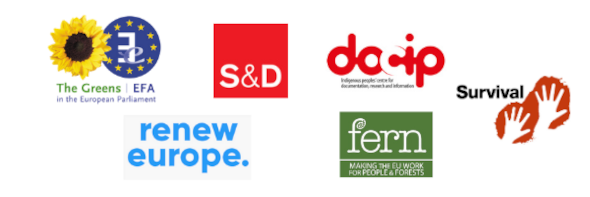Members of the European Parliament (MEPs):
- Michèle Rivasi, Greens/EFA, France
- María Soraya Rodríguez Ramos, Renew Europe, Spain
- Marc Tarabella, S&D, Belgium
NGOs:
- Docip
- Fern
- Survival International
9:00-9:30 AM: Introduction
"Opening words"
- Michèle Rivasi, Member of the European Parliament (MEP)
"The invention of green colonialism"
- Guillaume Blanc, Environmental historian, specialist of contemporary Africa and lecturer at University of Rennes 2
9:30 – 10:30 AM: Impact on indigenous and local communities
Moderation by Marc Tarabella, MEP
"Indigenous communities in the Democratic Republic of Congo (DRC)"
- Joseph Itongwa, Native Walikale from the province of North Kivu, founder of Réseau des Populations Autochtones et Locales pour la Gestion Durable des Ecosystèmes Forestiers de la RDC (REPALEF) sub-regional coordinator of Réseau des Populations Autochtones et Locales pour la Gestion des Ecosystèmes Forestiers d'Afrique Centrale (REPALEAC), DRC
"The riparian populations of Virunga National Park: challenges, limits and future”
- Delcasse Lukumbu, Congolese activist and member of Lucha RDC, Congolese citizen movement, DRC
"The impact of militarised and undemocratic nature conservation on Indigenous Peoples and forest dwellers in tiger reserves and other protected areas in India”
- Pranab Doley, Indigenous activist of the Mising people, Kaziranga, India
“Testimonies from Latin America“
- Lola Cabnal, Area de Incidencia en Politicas; Asociación Ak Tenamit, Guatemala
"How does the European Union ensure respect for Indigenous rights?"
- Chiara Adamo, Head of Unit for Gender, Human Rights and Democratic Governance, Directorate-General for International Cooperation and Development, European Commission
10:30 – 11:30 AM: Recommendations and priorities from indigenous peoples and local communities
Moderation by María Soraya Rodríguez Ramos, MEP
"Environment, women's rights and nomadic peoples"
- Hindou Oumarou Ibrahim, Association des femmes peules et peuples autochtones du Tchad (AFPAT), Chad
“Ending Green Colonialism”
- Mordecai Ogada, conservationist, Kenya
"Recognition of the customary rights of Indigenous Peoples over Indonesian forests"
- Rukka Sombolinggi, Alliance of Indigenous Peoples of the Archipelago (AMAN), Indonesia
"Experiences of the round table with experts and representatives of Indigenous Peoples"
- Luisa Ragher, Head of Division Human Rights, European External Action Service (EEAS)
11:30 AM – 12:30 PM: What model for biodiversity?
Moderation by Michèle Rivasi, MEP
"Why we must defend the Siberian forest and the rights of the inhabitants of the Far North and East of the country"
- Rodion Sulyandziga, former director of Raipon, The Russian Association of Indigenous Peoples of the North
"Nature conservation, militarisation and human rights violations: the role of international donors”
- Simon Counsell, former director of Rainforest Foundation UK and currently advisor to Survival International
"Enhancing the capacities ofIndigenous Peoples and Local Communities as stewards of nature"
- Herbert Lust, Vice President and Managing Director of Conservation International Europe
"Priorities of the EU’s biodiversity strategy at international level"
- Chantal Marijnissen, Head of Unit, Environment, Natural Resources, Water, Directorate-General for International Cooperation and Development, European Commission
12:30 – 1:00 PM: Wrap up & conclusions by MEPs Michèle Rivasi and María Soraya Rodríguez Ramos









